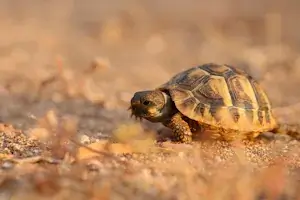Tortoise Care: A Comprehensive Guide for Beginners and Experienced Pet Lovers
Tortoises are among the most fascinating reptiles that you can keep at home. With their calm nature and impressive longevity, they are popular pets for people of all ages. However, tortoise care is demanding and requires a solid understanding of their needs, habitats, and care. In this article, you’ll learn everything important about tortoise care, from setting up the terrarium to proper nutrition.
1. Types of Tortoises: Aquatic or Terrestrial?
Terrestrial Tortoises
- Examples: Greek Tortoise, Hermann’s Tortoise
- Habitat: Dry, sunny regions with barren landscapes
- Care: Large enclosures with plenty of space to dig and sunbathe
Aquatic Tortoises
- Examples: Red-Eared Slider, Yellow-Bellied Slider
- Habitat: Freshwater areas with access to land
- Care: Combination of aquaterrarium and land areas
It’s crucial to know the species of your tortoise, as their needs vary greatly.
2. The Right Habitat for Tortoises
Terrarium for Terrestrial Tortoises
- Size: At least 2 m² per animal; bigger is always better.
- Substrate: A sand-soil mixture, suitable for digging.
- Lighting: UVB lamps for Vitamin D3 synthesis and heat lamps for basking spots.
- Temperature: 25–30°C during the day, 18–20°C at night.
- Setup: Hiding spots, shallow water dishes, and plants like succulents.
Aquaterrarium for Aquatic Tortoises
- Water Volume: At least 100 liters per tortoise.
- Land Area: Basking spots with rough surfaces for climbing.
- Filter: A powerful filter to keep the water clean.
- Temperature: Water 22–28°C, basking spot up to 35°C.
3. Tortoise Nutrition
Terrestrial Tortoises
- Main Food: Herbs, dandelions, clover, wild plants.
- Supplements: Cuttlefish bone for calcium supply.
- Forbidden: Fruits, protein-rich foods like meat or dog food.
Aquatic Tortoises
- Main Food: Water plants, food sticks, insects, small fish.
- Supplements: Varied diet such as shrimp and snails.
- Forbidden: Fatty or spiced foods.
4. Tortoise Care and Health Monitoring
Regular Cleaning
- Terrestrial Tortoises: Remove feces and food scraps daily. Clean the entire enclosure monthly.
- Aquatic Tortoises: Change the water regularly, clean the filter weekly.
Health Symptoms to Watch For
- Healthy Tortoises: Clear eyes, smooth shell, active behavior.
- Warning Signs: Poor appetite, breathing problems, soft shell.
If you notice any signs of illness, consult a reptile-experienced veterinarian.
5. Hibernation of Tortoises
Some tortoise species, such as the Greek Tortoise, require a hibernation period.
Preparation for Hibernation
- Gradually reduce temperature and food intake.
- Check your tortoise’s health before hibernation.
Carrying Out Hibernation
- Hibernate in a cool, dark room (4–10°C) or a special fridge.
- Regularly monitor weight and breathing.
Not all tortoise species hibernate – check the specific needs of your species.
6. Common Mistakes in Tortoise Care
Inadequate Enclosure Size
Many tortoises suffer in too small enclosures, which restrict their movement and can lead to behavioral problems.
Improper Nutrition
A diet too rich in protein often leads to growth disorders and diseases.
Neglecting UVB Lighting
Without UVB light, tortoises cannot produce Vitamin D3, leading to bone diseases.
Housing Different Species Together
Keeping different tortoise species together can cause stress and the transmission of diseases.
7. Getting a Tortoise
Buying from a Breeder
Only buy tortoises from reputable breeders who ensure species-appropriate care.
- Check for proof of origin and adherence to protection regulations (e.g., CITES certificate).
Cost of Keeping Tortoises
- Purchase Costs: 50–500€, depending on the species.
- Ongoing Costs: Food, lighting, and care – around 30–50€ per month.
8. Tips for Successful Tortoise Care
- Educate yourself thoroughly about the species before acquiring a tortoise.
- Provide your tortoise with plenty of space and a varied environment.
- Build a connection with your tortoise – patience is key.
9. Conclusion
Caring for tortoises is a long-term responsibility that is rewarded with great joy and fascinating insights. With proper preparation, a species-appropriate habitat, and a balanced diet, you can give your tortoise a healthy and happy life.

